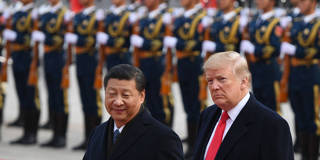Nowadays, it is common to hear arguments warning of a bifurcation of the global economy into mutually exclusive American and Chinese spheres of influence. But, 18 months after the first shots in the Sino-American trade war were fired, the situation is more complicated than that, owing not just to economic realities and the new coronavirus outbreak, but also each country's political priorities.
NEW YORK – The increasingly nonchalant deployment of the term “decoupling” to describe the long-term trajectory of US-China relations demonstrates anew that in diplomacy, words can be bullets. Of course, for some, “decoupling” simply reflects today’s unfolding reality, whereas for others, it is the desired outcome.
This second camp may be emboldened by the coronavirus outbreak that began in Wuhan. The epidemic has already taken more lives on the Chinese mainland than did the 2002-03 SARS outbreak, and it is also spreading more rapidly. It has reached at least two dozen countries, including the United States, and rattled Asian financial markets. As other countries rush to shield themselves from China, and as the Chinese economy slows as a result of the lockdown in many cities, fears of a global downturn loom large.
Foreigners who clinically calculate the impact of the virus on themselves should spare a thought for the humanitarian impact on millions of Chinese families living in fear and isolation, their small-business livelihoods often stretched to the breaking point, hoping and waiting for the outbreak to peak.

NEW YORK – The increasingly nonchalant deployment of the term “decoupling” to describe the long-term trajectory of US-China relations demonstrates anew that in diplomacy, words can be bullets. Of course, for some, “decoupling” simply reflects today’s unfolding reality, whereas for others, it is the desired outcome.
This second camp may be emboldened by the coronavirus outbreak that began in Wuhan. The epidemic has already taken more lives on the Chinese mainland than did the 2002-03 SARS outbreak, and it is also spreading more rapidly. It has reached at least two dozen countries, including the United States, and rattled Asian financial markets. As other countries rush to shield themselves from China, and as the Chinese economy slows as a result of the lockdown in many cities, fears of a global downturn loom large.
Foreigners who clinically calculate the impact of the virus on themselves should spare a thought for the humanitarian impact on millions of Chinese families living in fear and isolation, their small-business livelihoods often stretched to the breaking point, hoping and waiting for the outbreak to peak.